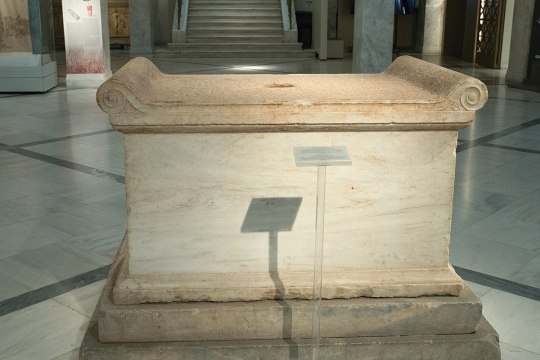#Χάρις
Explore tagged Tumblr posts
Text

Όταν η Καμάλα Χάρις επέλεξε να μην χρησιμοποιήσει τη Βίβλο για να ορκιστεί ως η νέα εισαγγελέας του Σαν Φρανσίσκο Στις 8 Ιανουαρίου του 2004 η Καμάλα Χάρις επέλεξε σκόπιμα να μην χρησιμοποιήσει τη Βίβλο όταν ορκιζόταν ως η νέα εισαγγελέας του Σαν Φρανσίσκο. Never forget that on January 8th, 2004 Kamala Harris intentionally chose not to use a Bible when swearing in as San Francisco’s new... Περι��σότερα εδώ: https://romios.gr/otan-i-kamala-charis-epelexe-na-min-chrisimopoiisei-ti-vivlo-gia-na-orkistei-os-i-nea-eisaggeleas-toy-san-fransisko/
#Εκλεκτά#Επίκαιρα#Βίβλο#για#εισαγγελέας#επέλεξε#Καμάλα#μην#να#νέα#ορκιστεί#όταν#σαν#τη#του#Φρανσίσκο#Χάρις#χρησιμοποιήσει#ως
0 notes
Text
Εσύ με ξέρεις πιο πολύ απ' όλους στη ζωή μου.
Για σένα ήταν πάντα απλό να ψάξεις να με βρεις.
#greek poetry#greek posts#greek quotes#greek tumblr#ποιηση#έντεχνο#έντεχνα#χάρις αλεξιου#αλεξίου#χάρις αλεξίου#χαρις αλεξιου#αλεξιου#πλιάτσικας#φιλιππος πλιατσικας#φίλιππος πλιάτσικας#φίλιππος πλιατσικας#φιλιππος πλιάτσικας#εσύ με ξέρεις πιο πολύ
236 notes
·
View notes
Text

Αποφάσεις,
εντάσεις,
καινούργιες προφάσεις
και φεύγεις ξανά.
Χάρις Αλεξιου, LEX - Φύγε
#λεξ#χάρις αλεξιου#greek quotes#writers on tumblr#greek aesthetic#artists on tumblr#aesthetic#ελληνικά στιχάκια#blue aesthetic#ποίηση#ραπ
402 notes
·
View notes
Text

Σε βρίσκω στο πλήθος ξανά
Στους δρόμους που η πόλη σχολά
Απρόβλεπτη που είν' η ομορφιά
Πάλι γελάς
Αμήχανα λίγο κοιτάς
Τι κοιτάς; Αγκαλιά να με πάρεις δες
Κανείς δε μας σκότωσε εμάς.
#νεφφ#greek tumblr#γκρεεκ#γκρικ ποστ#greek posts#ελληνικο ταμπλρ#γκρικζ#γκρεεζ#ελληνικα ποστ#μουσική#Χάρις Αλεξίου#Ένα Φιλί#θεσσαλονίκη#skg#skgstories
92 notes
·
View notes
Text







poems for grace - @imissthembutitwasntadisaster
Maggie Smith, Good Bones // Elizabeth Bishop, One Art // Taylor Swift, You're On Your Own Kid // Ocean Vuong, On Earth We're Briefly Gorgeous
#saw good bones saw one art saw that specific piece of oewbg and thought oh. there's my gracie.#didn't capitalize your name in the caption/didn't call you gracie as I usually would bc the idea is double meaning#grace. as in your name and also χάρις grace mercy unwarranted and unasked for just in being alive. just in existing.#I love you. I love you. I love you.#Lu rambles#web weaving#<3
54 notes
·
View notes
Text
#orgismenh#greek posts#greek tumblr#greek status#σκατοποσταρω#spotify#greek music#Χάρις Αλεξίου#βυθός
2 notes
·
View notes
Text
Παγιδεύονται, αφήνονται, πιέζονται.
Κόβουν, ράβουν και τελικά φοράνε λάθος νούμερο ρούχο.
Λες και είναι κακό να είναι ευτυχισμένοι..
Παράνομο να γελάνε. Ανώμαλο να χαίρονται.
Τι μιζέρια! Τι ρουτίνα!
Τι περιορισμός και στεναχώρια!
Χάρις Αλεξίου [maestro επεισόδιο 3 "Η προσευχή"]
15 notes
·
View notes
Text
Δεν έχω ακούσει κάποιον να περιγράφει καλύτερα από την Χάρις το πόσο εγωκεντρικά πλάσματα είμαστε οι άνθρωποι.
"Έξω ο κόσμος σπαράζει, κι εσύ το βιολί του εγώ σου."
"Τι κοιτάς τις πληγές σου λες και είσαι εσύ το θύμα της Γης;
Κάθε άνθρωπος έχει ένα βάσανο που δεν αντέχει."
6 notes
·
View notes
Text
Γεροντικό. Όταν ταπεινωθεί ο άνθρωπος κι αναγνωρίσει το σφάλμα του...
Δύο φίλοι συμφώνησαν ν’ ασκητέψουν. Πήγαν στην έρημο κι έφτιαξαν μια καλύβα, αλλά δεν κύτταξαν να βρουν Πνευματικό για να τους καθοδηγή. Έτσι παρανόησαν το σχετικό με τον πνευματικό ευνουχισμό ρητό του Ευαγγελίου και αυτοευνουχίσθησαν για να πάνε ευκολώτερα στη Βασιλεία των Ουρανών. Όταν το έμαθε ο Πατριάρχης Αλεξανδρείας, όχι μόνο τους επετίμησε αυστηρότατα, αλλά και από τη θεία Κοινωνία τους…
0 notes
Text
Εκλογές ΗΠΑ 2024: Άφαντη παραμένει η Χάρις μετά την ήττα - Καμία επικοινωνία με Τραμπ, τι εκτιμούν αναλυτές

Αρκετές ώρες έχουν ήδη περάσει από την ώρα που διαφάνηκε πως η πλάστιγγα γέρνει οριστικά προς την πλευρά του Ντόναλντ Τραμπ στις εκλογές για την προεδρία των ΗΠΑ και η μεγάλη του αντίπαλος, Κάμαλα Χάρις… παραμένει εξαφανισμένη!
Πηγή: https://www.protothema.gr/world/article/1559003/ekloges-ipa-2024-afadi-paramenei-i-haris-meta-tin-itta-kamia-epikoinonia-me-trab-ti-ektimoun-analutes/
0 notes
Text
Οι ΗΠΑ αναμετρούνται με την ιστορία τους – Αντιμέτωπος με τις ελίτ και τον αριστερό όχλο ο Trump, ακόμη και αν εκλεγεί πρόεδρος
Το μεγαλύτερο πρόβλημα του Trump είναι οι ελίτ που θα του βάλουν εμπόδια Έχει περάσει πολύς καιρός από τότε που έχουμε δει μια σημαντική θετική εξέλιξη στην αμερικανική κοινωνία.Στις πρώτες μέρες του κινήματος Ρον Πολ, υπήρξε μια ελπιδοφόρα βάση της υποστήριξης για μια νέα συντηρητική εποχή που υιοθέτησε τον φιλελευθερισμό και την αναγνώριση ότι οι περισσότερες «θεωρίες συνωμο��ίας» είναι στην…

View On WordPress
0 notes
Text

Έκκληση Robert F. Kennedy Jr στους Αμερικανούς: «Αν θέλετε να αποφύγετε τον πυρηνικό πόλεμο ψηφίστε Ντόναλντ Τράμπ – Η ψήφος στην Καμάλα Χάρις είναι ψήφος για τον Τρίτο Παγκόσμιο Πόλεμο» «Αν θέλετε να αποφύγετε τον πυρηνικό πόλεμο, σας προτρέπω έντονα να ψηφίσετε τον Ντόναλντ Τραμπ. Αν ο John F. Kennedy ζούσε σήμερα, θα στεκόταν δίπλα-δίπλα με τον Πρόεδρο Τραμπ. Στην πραγματικότητα, θα έφ... Περισσότερα εδώ: https://romios.gr/ekklisi-robert-f-kennedy-jr-stoys-amerikanoys-an-thelete-na-apofygete-ton-pyriniko-polemo-psifiste-ntonalnt-tramp-i-psifos-stin-kamala-charis-einai-psifos-gia-ton-trito-pagkosmio-pol/
#Επίκαιρα#Kennedy#Robert#Αμερικανούς#αν#αποφύγετε#για#είναι#ΕΚΚΛΗΣΗ#θέλετε#Καμάλα#να#Ντόναλντ#Παγκόσμιο#πόλεμο#πυρηνικό#στην#στους#τον#Τραμπ#Τρίτο#Χάρις#ψηφίστε#ψήφος
1 note
·
View note
Text
Σ’ έβλεπα απ’ το πλάι
Και έλεγα γελάει και σήμερα
#greek poetry#greek posts#greek quotes#greek tumblr#έντεχνα#ποιηση#έντεχνο#mariza rizou#μαρίζα ρίζου#ρίζου#αλεξίου#ελληνικά#Χάρις αλεξίου#χαρις αλεξιου#αλεξιου#συναυλία#συναυλια
212 notes
·
View notes
Text
Η Χάρις Αλεξίου και ο Χρήστος Μάστορας στο #1 του Official IFPI Airplay Chart!
Το πρόσφατο άλμπουμ “Reworks” της Χάρις Αλεξίου συνεχίζει τη δυναμική πορεία του. Έχοντας συγκεντρώσει εκατομμύρια views και streams και με τα singles να φιγουράρουν στις πρώτες θέσεις των digital charts (YouTube, Spotify, Shazam), άλλη μία πρωτιά έρχεται να προστεθεί. Η συνεργασία της σπουδαίας ερμηνεύτριας με τον Χρήστο Μάστορα στο «Εσύ με ξέρεις πιο πολύ» κατακτά την κορυφή των ελληνικών…

View On WordPress
0 notes
Text
My Personal “Pillars of Hellenic Polytheism”
You may have seen or heard of the “7 Pillars of Hellenism”. The creator of these pillars, Timothy Jay Alexander, is known to be extremely homophobic and bigoted, and therefore these pillars aren’t seen in a positive light by many Hellenic Polytheists, including myself.
That being said, personally, I like to have sort of guidelines to follow, and Alexander isn’t the only one to have created “moral pillars”. So I took inspiration from multiple sources, including @/hyakinthou-naos in one of their recent posts, to make my own pillars. These are things that are important to me, personally, and they may differ from yours if you have some. I chose to have 5 pillars as it is a number associated with Lady Aphrodite, and the pillars will be listed in alphabetical order.
Hekousios- Ε´κουσίος
ἑκούσιος translates to “free will” or “voluntary”. To me, this means to do things at your own pace, and to always have worship be a personal choice, not something put on someone.
Kharis - Χάρις
Kharis can be translated to “grace, kindness, goodwill, elegance, favour, joy, charity, beauty”, “reciprocity”, “grace, favor, goodwill”, or a reciprocal relationship with the Gods. To me, this means to not ask for things without offering something in return, to not take advantage of gifts from the Gods.
Periergia - Περιέργεια
Periergia translates to curiosity and is often associated with devotion to researching something. For me, this means to always be curious, open to new ideas, and never stop learning new things. It also means to never claim that I know everything, and be willing to research things I don’t know much about.
Symmakhia - Σύμμαχία
Symmakhia translates to “allyship”. It also happens to be an epithet of Lady Aphrodite! It is usually used in the context of military and war, but here, I am using this word in the context of allyship and support towards marginalized groups. Allyship is active, and so to me, this pillar means to show active support to those that are a part of marginalized or minority communities.
Xenia - Ξενία
Xenia is the concept of guest-friendship or hospitality. For me, this means kindness and hospitality towards those from all walks of life and lived experiences, as long as it is safe to do so.
#beautyofaphrodite shrine#beautyofaphrodite speaks#helpol#aphrodite#hellenic community#hellenic deities#hellenic gods#hellenic pagan#hellenic polytheism#hellenic polythiest#hellenic worship#pillars of hellenism#pillars of hellenic polytheism#xenia#symmachia#periergia#kharis#hekousios#hellenic paganism#hellenic polytheistic#hellenism#hellenic devotion#hellenismos#pagan#paganism#paganblr
394 notes
·
View notes
Text
Altars in Ancient Greece
A disclaimer before we get into it: this is a brief explanation of how altars functioned in ancient Greece. I am not telling you how you should set up your own personal altar(s). Rather, I hope this can serve as foundational knowledge for you to consider while figuring out what works best for you and your practice.

Pentelic marble altar from the ancient agora of Athens. Dedicated by the Athenian Boule to Aphrodite and the Graces. c. 194-193 BCE.
The purpose of the altar is to receive offerings for the deity. It is the sacred place where worshipers pour their libations of wine, deposit their gifts of fruit, honey, or cakes, and burn a portion of the sacrificial animal. Offerings in ancient Greece were a key component of religious life; it is how mortals express their honor and build χάρις (kharis, favor). The altar is a highly important point of contact with the divine, and is an essential physical element for any cult to be established.
In fact, we can determine whether or not a deity was worshiped in ancient Greece based on if there were any altars dedicated to them. A god or daimon with no altars was very likely only part of the mythological or literary tradition and did not receive any sacrifices or worship. Altars were generally dedicated to one god or a group of related deities. In rarer cases, they may be dedicated to the whole pantheon (example: the Altar of the Twelve Gods in the Athenian Agora).
An altar for a heavenly (ouranic) god would be a raised surface or pedestal, and it would be oriented towards the East. The typical Greek altar consisted of bricks which were white-washed with lime, or it was carved from stone such as marble or limestone. They could be plain, or they could be decorated with volutes and narrative scenes. They often had the name of the deity inscribed into them. Altars could also come in a variety of shapes, the only real requirement being that the surface on top was flat so it could hold the offerings.
More prominent cult sanctuaries may feature a large, elevated altar with steps leading up to it. There were also natural rock altars, or in very rustic sanctuaries, a collection of stones was grouped to form an altar. If one was worshiping a khthonic god who dwells on or within the earth, they would provide sacrifices at a low-lying altar such as an eschara, or a simple open pit called a bothros.
Indoor altars were very uncommon. At sanctuaries, the altar would be outside of the gods temple, often in front of the entrance. Though a sanctuary could contain several altars and sacrificial sites. Households would have had one in their courtyard for private worship. Other altars were located outside of public buildings or in community gathering places like an agora.
The reason for being outdoors was so that the gods who reside in the sky could observe the sacrifices being made and enjoy the rising smoke of the incense. Meanwhile, a libation poured directly onto the bare earth would seep down below to the khthonic gods. Every altar was ceremonially sanctified when its first sacrifice was performed; from then on, it was considered part of the property of the deity.
Below are my sources. I'll likely make a part two of this post where I go over some ideas for how we can construct our modern altars. Thank you for reading!
Ancient Greek Religion, Jon D. Mikalson
Greek Religion, Walter Burkert
Ancient Greek Cults, Jennifer Larson
#if you find any mistakes pleeeease let me know so i can correct it#hellenic polytheism#hellenic reconstructionism#helpol#ancient greek religion#hellenic pagan#greek gods#hellenismos
280 notes
·
View notes